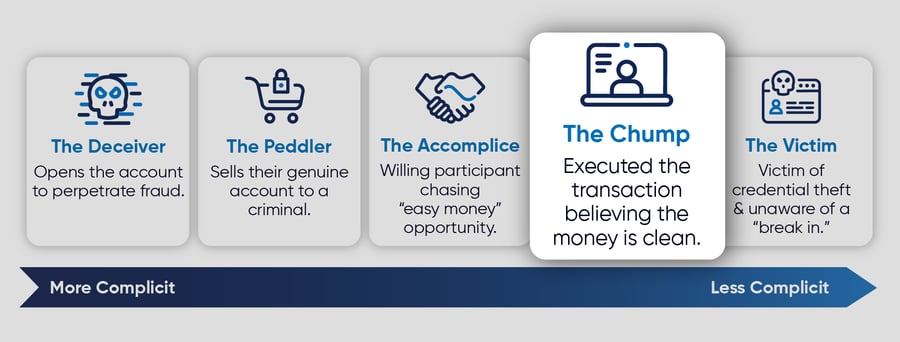In the last blog of our money mule persona series, we explored The Accomplice, the willing participants within a mule account/money laundering operation. As a quick recap, the mule account accomplice can be a third-party participant or a member of a larger criminal organization. But regardless of their ties, they are knowingly and willingly acting as a mule and can be legally held responsible.
Before we look at the next persona in this series, let’s stop and ask ourselves a few questions. What if the participant was acting as a mule unwillingly? What if they didn’t know what they were doing or only knew a few details? What if they were completely taken advantage of? Could they still be held responsible? Is ignorance an excuse for breaking the law?
To kick things off, I tried to think of a time where I participated in something that I thought was legit when in fact it wasn’t. When I was younger, I used to collect coins, cards, and sports memorabilia. A friend at the time, or so I thought, would regularly have 1st edition cards. For years I would purchase and trade for these cards at discounted rates or for lesser valued items. I found out later that some of the items were fake or stolen and I had clearly been deceived. In this scenario, I unfortunately was The Chump. Looking back now, there were clearly signs that something was wrong, but they were blissfully ignored. If only I had access to the right tools and resources to catch the scam earlier or prevent it from happening in the first place.
By now, I’m sure you have figured out that The Chump is the next persona we’re breaking down. The Chump is someone that has executed a mule transaction believing that the money is clean. Their motives are similar to some of the other personas as they’re looking for easy money, tax breaks, etc. However, there is one key distinction. The Chump is led to believe that the operation is legal.

There are many ways criminals use legitimate businesses to launder money and convince unknowing mules to participate. Some of these examples include casinos, real estate, cash-businesses, and philanthropic organizations. They even advertise on LinkedIn hoping to recruit job seekers with the lure of lucrative job opportunities. These operations can easily convince many supporters to invest, donate, and transfer money. Any individual who unknowingly transfers money for a business that is a front to launder money would be considered a Chump and could potentially be subject to legal ramifications.
So, what happens when you unknowingly break the law? According to www.marchianolawcorp.com many people break laws every day, whether they realize it or not, and ignorance of the law is no defense. Now while you may be able to use “mistake of fact” as a defense (meaning you did not completely understand the details and conditions around the criminal activity you are alleged to have performed), there is no guarantee you’ll be found innocent.
So, what can you do? As a consumer, make sure to ask questions, do your research, avoid “easy money” opportunities, and remember if it seems too good to be true, it probably is. As a bank or financial institution, behavioral biometric solutions like BioCatch Mule Account Detection can help identify knowing and unknowing mule activity early on, before it becomes an operational headache.
Are you ready to change the way your organization detects mule accounts and money laundering? Discover how one large Australian bank used behavioral biometrics to disrupt mule operations and stop over 90% of fraudulent payments before they occurred. Download the case study today.



